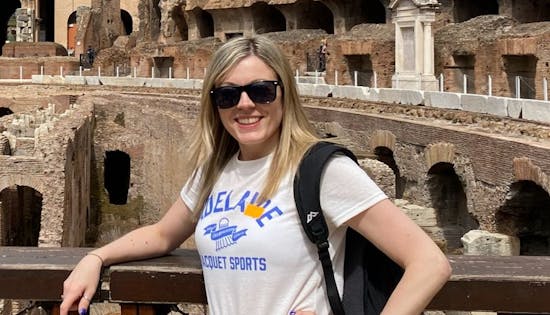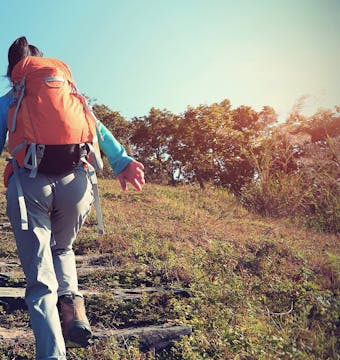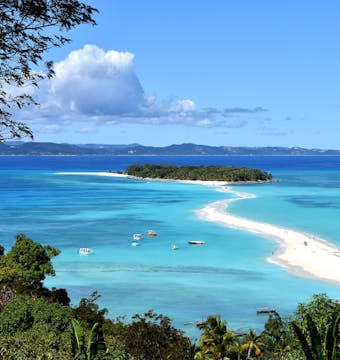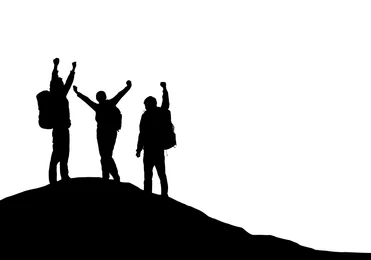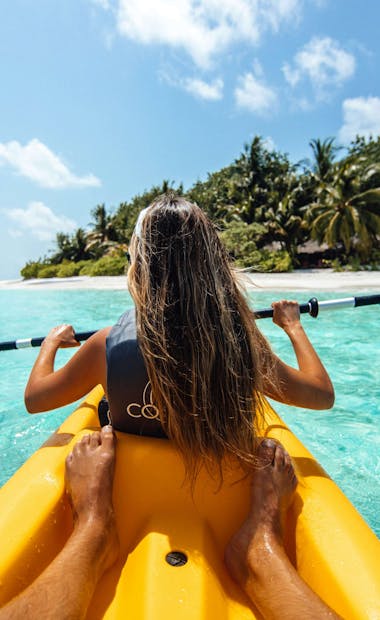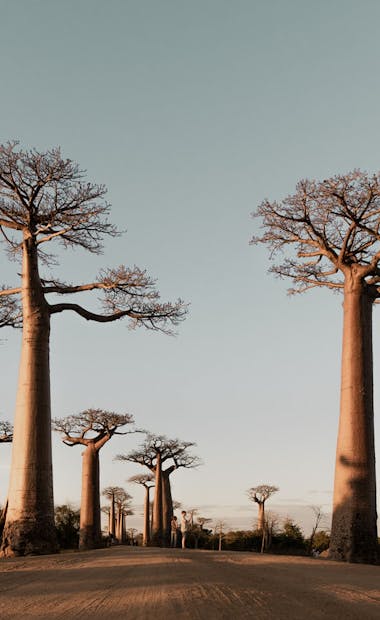
Madagascar Tours
Land of the Lemurs, plus white sandy beaches and stunning rain forests
Popular tours
- Save31%
 View Tour
View TourMadagascar Adventure - 14 Days
- Antananarivo to Antananarivo
- Age group: 15 - 99
- Max group size: 12
Was:£2,860From£1,982 - Save21%
 View Tour
View TourHighlights of Madagascar - 14 Days
- Antananarivo to Antananarivo
- Age group: 12 - 100
- Max group size: 16
Was:£2,199From£1,742 - Save11%
 View Tour
View TourMadagascar: The Lost Continent - 15 Days
- Antananarivo to Antananarivo
- Age group: 16 - 79
- Max group size: 16
Was:£3,050From£2,722 - Save10%
 View Tour
View TourMadagascar Wilderness Trek - 15 Days
- Antananarivo to Antananarivo
- Age group: 16 - 79
- Max group size: 16
Was:£3,210From£2,881 - Save1%
 View Tour
View TourMadagascar Baobabs & Beyond - 11 Days
- Antananarivo to Antananarivo
- Age group: 15 - 99
- Max group size: 12
Was:£1,980From£1,960 - Save1%
 View Tour
View TourMadagascar in Depth - 24 Days
- Antananarivo to Antananarivo
- Age group: 15 - 99
- Max group size: 12
Was:£4,720From£4,673
Madagascar Tours
Welcome to the enchanting island of Madagascar, a tropical paradise nestled in the Indian Ocean! Prepare to embark on a remarkable journey filled with breathtaking landscapes, diverse wildlife, and a vibrant culture. If you're seeking an unforgettable experience, look no further than Madagascar tours and holidays. Our travel agency is here to curate the perfect itinerary, tailored to your desires, ensuring that you make the most of your time in this extraordinary destination.
Madagascar, the fourth largest island in the world, is a true gem of biodiversity. Boasting a vast array of unique plant and animal species found nowhere else on Earth, it's a nature lover's dream come true. From the lush rainforests of Masoala National Park to the otherworldly stone forests of Tsingy de Bemaraha, each corner of this island holds a delightful surprise. Embark on thrilling hikes through dense jungles, marvel at magnificent waterfalls, and encounter charming lemurs swinging gracefully from tree to tree. With our carefully crafted Madagascar tours, you'll have the chance to witness nature's wonders up close and personal.
But Madagascar is not just about its captivating wildlife. This island nation also offers a rich tapestry of cultural experiences. Immerse yourself in the warmth and hospitality of the Malagasy people as you explore traditional villages, discover the intricate art of weaving, and indulge in the tantalizing flavors of the local cuisine. From bustling markets filled with vibrant handicrafts to the soul-stirring melodies of traditional music, every moment in Madagascar is a celebration of its rich heritage.
Whether you're an adventurous soul seeking thrilling outdoor activities or a traveler yearning for tranquility on pristine beaches, Madagascar has it all. Picture yourself diving into crystal-clear waters teeming with colorful marine life, exploring hidden caves, or simply basking in the sun on idyllic stretches of sand. Our Madagascar holidays are designed to cater to every taste, allowing you to create memories that will last a lifetime.
At our travel agency, we understand the value of a well-planned and seamlessly executed trip. Our team of experienced professionals will work closely with you to design a customized itinerary that matches your interests, preferences, and budget. From arranging comfortable accommodations to organizing thrilling excursions, we'll take care of every detail, ensuring a stress-free and immersive travel experience.
Madagascar is a true paradise waiting to be explored. So, let us guide you through this magnificent island, unlocking its secrets and revealing its unparalleled beauty. With our Madagascar tours and holidays, get ready for an adventure like no other, where nature's wonders and cultural treasures blend harmoniously. Start planning your journey today and discover the magic of Madagascar!
When is the best time to visit Madagascar?
The best time to visit Madagascar largely depends on your preferences and the experiences you seek. The country experiences a tropical climate, characterized by a wet and dry season. Here's a breakdown of the seasons to help you plan your ideal trip:
Dry Season (April to October): The dry season in Madagascar is considered the peak tourist season. During this time, the weather is generally pleasant, with lower humidity and minimal rainfall. It's an excellent time for wildlife viewing, as many animals are drawn to water sources, making them easier to spot. The dry season is also ideal for outdoor activities like hiking, exploring national parks, and visiting coastal regions. However, it's worth noting that the southern regions can become quite hot during these months.
Wet Season (November to March): The wet season in Madagascar brings lush greenery and a vibrant burst of life. While rainfall can be more frequent, it usually occurs in short bursts, allowing for enjoyable travel experiences. The wet season is an excellent time for birdwatching, as migratory birds flock to the island. It's also a fantastic period for photography, as the landscapes are at their most vibrant. Keep in mind that some roads and remote areas may become inaccessible due to the rains, and cyclones can occasionally occur, particularly in the eastern regions.
Shoulder Seasons (April and October): The shoulder seasons, which fall between the wet and dry seasons, can be a fantastic time to visit Madagascar. These transitional periods offer a mix of favorable weather conditions, fewer crowds, and potentially lower prices. In April, you may still catch the tail end of the wet season with lush landscapes, while October marks the start of the dry season, promising pleasant temperatures and excellent wildlife spotting opportunities.
Ultimately, the best time to visit Madagascar depends on your interests and priorities. Whether you prefer a dry and sunny adventure or don't mind occasional showers amidst lush surroundings, Madagascar's diverse climate and ecosystems offer something for everyone. To ensure the most comfortable and rewarding experience, it's always a good idea to consult with our travel experts who can help tailor your itinerary based on your preferred travel dates and desired activities.
Will I need a visa to travel to Madagascar?
Yes, most travelers will require a visa to enter Madagascar. The visa regulations may vary depending on your nationality and the purpose of your visit. It's important to check the specific visa requirements for your country of residence before traveling.
For many visitors, a tourist visa is the appropriate choice. Here are some general guidelines regarding tourist visas for Madagascar:
Visa on Arrival: Citizens of several countries can obtain a 30-day tourist visa upon arrival at the airport in Antananarivo, the capital city of Madagascar. This option is available for citizens of the European Union, the United States, Canada, Australia, and many other countries. However, it's advisable to check the current visa policies and any recent updates before your departure.
E-Visa: Some countries have an e-visa system in place, allowing travelers to apply online before their trip. The e-visa simplifies the process and saves time upon arrival. You can visit the official website of the Malagasy Embassy or consulate in your country to check if e-visas are available for your nationality.
Pre-Arranged Visa: In certain cases, travelers might need to obtain a visa before arriving in Madagascar. This requirement applies to citizens of countries without visa on arrival or e-visa options. It's essential to contact the nearest Malagasy Embassy or consulate well in advance to understand the visa application process and requirements.
Regardless of the type of visa you apply for, it's advisable to ensure your passport is valid for at least six months beyond your intended departure date from Madagascar. Additionally, having proof of return or onward travel, as well as sufficient funds to cover your stay, may be required.
As visa requirements can change, it's always recommended to check with the relevant Malagasy authorities or consult with our travel agency for the most up-to-date and accurate information regarding visa regulations for your specific situation.
What are the main attractions of visiting Madagascar?
Madagascar offers an abundance of captivating attractions that make it a unique and sought-after destination. Here are some of the main highlights you can look forward to when visiting this extraordinary island:
Biodiversity and Wildlife: Madagascar is renowned for its unparalleled biodiversity. It's home to an astonishing array of flora and fauna found nowhere else on Earth. One of the biggest draws is the chance to encounter lemurs, the iconic primates that have evolved into various species across the island. Explore national parks like Andasibe-Mantadia, Ranomafana, or Isalo to witness lemurs in their natural habitats. Marvel at the peculiar baobab trees, discover chameleons and unique reptiles, and encounter countless bird species, making Madagascar a paradise for nature lovers.
National Parks and Reserves: Madagascar boasts a network of protected areas and national parks that showcase its incredible ecosystems. Explore the otherworldly landscapes of Tsingy de Bemaraha, a UNESCO World Heritage site featuring towering limestone formations and deep canyons. Discover the lush rainforests of Masoala National Park, the largest protected area in the country, or Ankarafantsika National Park, known for its diverse birdlife and stunning lakes. Each park offers distinct experiences, from trekking through dense forests to encountering endemic wildlife.
Stunning Beaches and Marine Life: Madagascar is blessed with pristine beaches and crystal-clear waters. Head to Nosy Be, a tropical paradise known for its idyllic beaches, snorkeling, and diving opportunities. Explore the surrounding islands, such as Nosy Komba and Nosy Sakatia, for a chance to swim with turtles, spot colorful fish, and even encounter majestic whale sharks during the appropriate season. The underwater world of Madagascar is a treasure trove for divers and snorkelers.
Cultural Experiences: Immerse yourself in the rich cultural heritage of Madagascar by exploring traditional villages and engaging with the warm-hearted Malagasy people. Visit the highland town of Antananarivo to discover its bustling markets, historical sites, and vibrant street life. Witness the art of silk weaving in the town of Antsirabe or learn about the ancient customs and rituals of the Malagasy people. The cultural experiences in Madagascar provide a deeper understanding of the island's fascinating history and traditions.
Adventure and Outdoor Activities: Madagascar offers thrilling adventure opportunities for the intrepid traveler. Go trekking in the rugged mountains of Andringitra National Park, summit the iconic peak of Mount Maromokotro, or go kayaking along the mangrove-lined rivers of the Pangalanes Canal. With its diverse landscapes, Madagascar presents endless possibilities for outdoor enthusiasts seeking adrenaline-pumping activities.
These are just a glimpse of the main attractions that await you in Madagascar. The island's natural wonders, unique wildlife, cultural richness, and adventure opportunities make it a truly exceptional destination that promises a remarkable and unforgettable experience.
What is the local currency in Madagascar, and can I use credit cards?
The local currency in Madagascar is the Malagasy Ariary (MGA). It's advisable to have some local currency with you for smaller transactions, especially in more remote areas. It's recommended to exchange your currency for Ariary upon arrival at the airport, in major cities, or at authorized currency exchange offices. Be sure to keep your exchange receipts, as they may be required when converting unused Ariary back to your home currency.
Credit cards are accepted in larger hotels, upscale restaurants, and some tourist establishments in major cities like Antananarivo and Nosy Be. However, it's important to note that credit card acceptance can be limited outside of these areas, and smaller businesses, markets, and local vendors often deal only in cash. It's advisable to carry some cash with you for transactions in more rural or remote areas.
When using credit cards in Madagascar, Visa and Mastercard are the most widely accepted, while American Express and other cards may have more limited acceptance. Always inform your bank or credit card company of your travel plans to ensure your card will work internationally and to prevent any unexpected issues with transactions.
ATMs are available in major cities and towns, where you can withdraw cash using your debit or credit card. However, it's essential to have a backup plan and carry sufficient cash, as ATMs may not be easily accessible in remote areas.
It's worth noting that foreign currency, particularly Euros and US Dollars, may be accepted by some establishments, especially in the tourism sector. However, it's recommended to have local currency for convenience and to avoid any potential complications.
As always, it's advisable to keep your money and valuables secure while traveling and to consult with your bank or credit card provider regarding any fees or restrictions associated with international transactions.
What wildlife am I likely to see in Madagascar?
Madagascar is a treasure trove of unique and fascinating wildlife, with a vast array of species found nowhere else on the planet. Here are some of the remarkable wildlife you can encounter during your visit to Madagascar:
Lemurs: Lemurs are Madagascar's most iconic and beloved inhabitants. With over 100 species, these charismatic primates come in a variety of shapes, sizes, and behaviors. From the playful ring-tailed lemurs to the elusive indri lemurs with their haunting calls, encountering lemurs in their natural habitats is an unforgettable experience.
Chameleons: Madagascar is renowned for its incredible diversity of chameleons. From the small and colorful panther chameleons to the larger and more camouflaged Parson's chameleon, these fascinating reptiles showcase a remarkable range of colors, patterns, and body shapes.
Baobab Trees: While not wildlife in the traditional sense, Madagascar is home to several species of baobab trees, which have a mythical and awe-inspiring presence. The Avenue of the Baobabs in western Madagascar is a famous site where majestic baobab trees line the road, creating a truly surreal and breathtaking landscape.
Birds: Madagascar is a birdwatcher's paradise, boasting over 260 bird species, of which a significant number are endemic. Keep an eye out for the vibrant and critically endangered Madagascar paradise flycatcher, the stunningly patterned couas, and the majestic fish eagle. Bird enthusiasts will have a field day exploring the island's diverse habitats.
Reptiles and Amphibians: Madagascar is home to a remarkable assortment of reptiles and amphibians. You may encounter the colorful and playful frogs like the tomato frog and the golden mantella. The bizarre leaf-tailed geckos, with their incredible camouflage, are another fascinating sight. And don't forget the impressive Nile crocodiles, which can be found in certain river systems and wetland areas.
Fosa: The fosa is a unique carnivore native to Madagascar and is the largest predator on the island. Resembling a cross between a cat and a dog, these agile and elusive creatures are known for their tree-climbing skills and play a crucial role in the island's ecosystem.
These are just a few examples of the incredible wildlife you can expect to encounter in Madagascar. The island's isolation has resulted in a stunning array of endemic species, making it a biodiversity hotspot unlike any other. Exploring the national parks, reserves, and diverse habitats of Madagascar offers an unparalleled opportunity to witness these remarkable creatures in their natural habitats and contribute to the conservation efforts aimed at protecting their fragile ecosystems.
Is Madagascar a good destination for solo travellers?
Yes, Madagascar can be an excellent destination for solo travelers. The island offers a unique and adventurous experience that can be particularly rewarding for those exploring on their own. Here are some reasons why Madagascar is well-suited for solo travelers:
Unparalleled Biodiversity: Madagascar's incredible biodiversity and unique wildlife make it a captivating destination for solo adventurers. Exploring the national parks and reserves allows you to immerse yourself in the diverse ecosystems, encounter lemurs, discover fascinating reptiles and amphibians, and marvel at the stunning flora and fauna found nowhere else on Earth. The experience of witnessing these natural wonders firsthand can be truly awe-inspiring.
Trekking and Outdoor Activities: Madagascar offers various opportunities for outdoor activities that solo travelers can enjoy. From trekking through lush rainforests and scaling rocky peaks to kayaking along rivers and exploring caves, the island presents a range of adventures. Engaging in these activities provides a chance to connect with nature, challenge oneself, and create memorable experiences.
Cultural Immersion: Solo travelers can immerse themselves in the rich cultural heritage of Madagascar. Interacting with the warm-hearted Malagasy people, visiting traditional villages, and learning about their customs, music, and cuisine can offer a deeper understanding of the local way of life. Engaging with locals and fellow travelers can also provide opportunities for meaningful connections and cultural exchange.
Unique Photography Opportunities: For solo travelers with a passion for photography, Madagascar offers endless opportunities to capture stunning images. The diverse landscapes, vibrant wildlife, intricate details of flora, and vibrant cultural scenes provide an abundance of subjects to capture through your lens.
Personal Growth and Reflection: Traveling alone in Madagascar allows for personal growth, self-discovery, and reflection. It offers a chance to step out of your comfort zone, navigate new environments independently, and learn more about yourself in the process. The solitude and freedom of solo travel can be empowering, allowing you to connect with nature and the island's unique experiences on a deeper level.
It's important to note that Madagascar, like any travel destination, requires thorough planning and precautions for solo travelers. Researching safety guidelines, understanding local customs, and taking necessary precautions can contribute to a smooth and enjoyable journey. Engaging with reputable local guides or joining organized tours can enhance your experience and provide additional support during your travels.
Overall, Madagascar's natural wonders, cultural richness, and opportunities for adventure make it an enticing destination for solo travelers seeking a unique and rewarding experience.
Is Madagascar a good family holiday destination?
Yes, Madagascar can be a fantastic destination for a family holiday! The island offers a unique blend of adventure, wildlife, nature, and cultural experiences that can captivate both children and adults. Here are some reasons why Madagascar is well-suited for a family vacation:
Wildlife Encounters: Madagascar's extraordinary wildlife, especially lemurs, is sure to capture the imaginations of children. The chance to see lemurs up close, observe their playful behaviors, and learn about their fascinating adaptations can create unforgettable memories for the whole family. Exploring national parks, such as Andasibe-Mantadia or Ranomafana, provides opportunities to spot a variety of animals and birds, making it an exciting and educational experience.
Nature and Outdoor Activities: Madagascar offers diverse landscapes and outdoor adventures that can engage the entire family. From hiking through lush rainforests and swimming in pristine waterfalls to kayaking along scenic rivers and exploring caves, there are plenty of opportunities for active and nature-oriented activities. Children can learn about the importance of conservation, biodiversity, and the beauty of the natural world.
Cultural Immersion: Experiencing the local culture and traditions of Madagascar can be enriching for the whole family. Visiting traditional villages, interacting with the friendly Malagasy people, and learning about their customs, music, and crafts can broaden children's horizons and foster an appreciation for different cultures.
Educational Opportunities: Madagascar offers a unique learning experience for children. Exploring the island's rich biodiversity and endemic species can spark curiosity about the natural world and conservation efforts. Many national parks and reserves have visitor centers or guides who can provide educational insights and activities tailored to children, making it a fun and informative journey.
Beaches and Relaxation: Madagascar's beautiful beaches, with clear turquoise waters and soft sands, provide opportunities for relaxation and family fun. Whether building sandcastles, snorkeling, or simply enjoying the sun, the coastal areas of Madagascar offer a laid-back and rejuvenating atmosphere for the whole family to unwind.
It's important to plan and choose activities that suit your family's interests and the age of your children. Consulting with a reputable travel agency that specializes in family travel can help create an itinerary that balances adventure, relaxation, and educational experiences. With proper preparation and guidance, Madagascar can provide an unforgettable family holiday filled with discovery, adventure, and cherished moments.
Is Madagascar a safe destination?
Madagascar is generally considered a safe destination for travelers. However, like any travel destination, it's important to take certain precautions to ensure a safe and enjoyable trip. Here are some safety tips to keep in mind when visiting Madagascar:
Stay Informed: Before your trip, research the current political situation, local customs, and any potential travel advisories issued by your country's government. Stay updated on the latest news and developments that may affect your travel plans.
Choose Reputable Accommodation: Opt for well-established and reputable accommodation options, especially in major cities and tourist areas. Check online reviews and consider recommendations from trusted sources to ensure a safe and comfortable stay.
Transportation Safety: Use registered taxis or reliable transportation services recommended by your accommodation. If you're renting a vehicle, be cautious on the roads and familiarize yourself with local driving conditions and regulations.
Personal Belongings: Keep your personal belongings secure at all times, especially in crowded areas or public transportation. Use a money belt or a secure bag to carry your important documents, cash, and valuables. Avoid displaying expensive items that may attract attention.
Health and Hygiene: Consult a healthcare professional well in advance of your trip to Madagascar to ensure you're up to date on necessary vaccinations and medications. It's also important to maintain good hygiene practices, such as washing hands regularly and drinking bottled or purified water.
Cultural Sensitivity: Respect the local customs, traditions, and religious practices of the Malagasy people. Dress modestly, particularly when visiting religious sites or interacting with local communities.
Natural Environment: Take precautions when exploring the natural environment, such as national parks and reserves. Follow the guidelines provided by park authorities, stay on designated paths, and be aware of any potential hazards or wildlife encounters.
Travel Insurance: Purchase comprehensive travel insurance that covers medical emergencies, trip cancellation, and personal belongings. Ensure that it includes coverage for adventure activities and any specific activities you plan to undertake.
As with any travel destination, it's important to exercise caution and be aware of your surroundings. By staying informed, using common sense, and following these safety tips, you can have a safe and enjoyable experience exploring the wonders of Madagascar.
Will I require any vaccinations to travel to Madagascar?
Yes, certain vaccinations are recommended for travelers visiting Madagascar to protect against specific diseases. It's important to consult with a healthcare professional or a travel health clinic well in advance of your trip to receive up-to-date and personalized advice based on your health status and travel plans. Here are some vaccinations that are typically recommended for travel to Madagascar:
Routine Vaccinations: Ensure that you are up to date on routine vaccinations, including measles-mumps-rubella (MMR), diphtheria-tetanus-pertussis, varicella (chickenpox), and polio vaccines.
Yellow Fever: A yellow fever vaccination is required for travelers coming from countries with a risk of yellow fever transmission. If you are arriving from a country with no risk of yellow fever, the vaccination is generally not required. However, it's important to check the latest requirements and recommendations, as regulations may change.
Hepatitis A: Hepatitis A is transmitted through contaminated food and water. It is recommended for all travelers to Madagascar, as the risk of exposure to contaminated food and water sources can be higher.
Typhoid Fever: Typhoid fever is also transmitted through contaminated food and water. It is recommended, particularly if you will be staying in areas with poor sanitation or if you are planning to eat street food.
Hepatitis B: Hepatitis B is spread through blood, sexual contact, and contaminated needles. It is recommended for travelers who may have intimate contact with local residents, require medical treatments, or engage in activities that could lead to exposure to blood or body fluids.
Rabies: Rabies is present in Madagascar, and it is recommended to consider the rabies vaccine if you will be engaging in activities that involve close contact with animals or if you will be in remote areas with limited access to medical facilities.
Additionally, it's advisable to ensure that your routine vaccinations, such as tetanus and measles, are up to date before traveling to Madagascar.
It's essential to remember that vaccination recommendations may vary depending on factors such as the duration of your stay, specific activities planned, and the regions you'll be visiting within Madagascar. Therefore, it's best to consult with a healthcare professional who specializes in travel medicine to receive personalized advice tailored to your needs.
How does the rooming work on tours?
Small group tours in Madagascar typically involve a set itinerary where you travel with a group of fellow travellers and a tour leader/guide. Accommodation arrangements vary depending on the specific tour you choose. Here are some common aspects of rooming arrangements on small group tours:
Shared Rooms: In order to promote camaraderie and facilitate interaction among group members, most tours arrange shared accommodation. This means you will be paired with another member of the same gender from the group to share a room. Roommates may sometimes change periodically throughout the tour.
Single Supplement: If you prefer to have your own room and privacy, you may have the option to pay a single supplement fee. This additional fee allows you to have your own room for the duration of the tour. However, please note that single supplements can vary in cost and availability.
Roommate Matching: Tour operators usually offer roommate matching services, where they try to pair you with a suitable roommate based on your preferences, such as age range. This can help ensure compatibility and a more enjoyable experience for all participants.
Rooming Preferences: When booking your small group tour, it's important to communicate your rooming preferences to the tour operator. If you have specific requirements or preferences, such as sharing with a friend or a specific roommate request, it's advisable to inform the tour operator during the booking process.
It's important to carefully read the tour details and inclusions provided by the tour operator to understand their specific rooming policies. If having your own room is a priority, make sure to inquire about the availability of single supplements and any associated costs before booking your tour.
Keep in mind that while sharing a room with a fellow traveller can be a great way to meet new people and build connections, having your own room provides more privacy and flexibility. Consider your preferences and the dynamics of the tour when deciding whether to opt for a shared room or pay for a single supplement.
Remember to communicate your needs and preferences clearly with the tour operator during the booking process to ensure a comfortable and enjoyable accommodation experience on your small group tour in Madagascar.
What is the food like in Madagascar?
The cuisine of Madagascar reflects the island's diverse cultural heritage and abundance of local ingredients. Malagasy cuisine features a variety of flavors, spices, and traditional dishes that are influenced by African, Arab, Indian, and French culinary traditions. Here's an overview of the food you can expect to encounter in Madagascar:
Rice: Rice is the staple food of Madagascar and forms the base of most meals. It is typically served with various accompaniments, such as meat, fish, vegetables, or sauces. The Malagasy people have a saying that "Rice is life" (vary amin'anana), emphasizing its importance in their diet.
Romazava: Romazava is a popular traditional dish in Madagascar. It is a meat and vegetable stew made with a variety of ingredients such as beef, pork, chicken, or fish, combined with leafy greens, onions, and garlic. It is often flavored with local spices and served with rice.
Ravitoto: Ravitoto is a classic Malagasy dish made from shredded manioc leaves (similar to taro leaves) or spinach, cooked with meat (pork, beef, or sometimes seafood) and flavored with garlic, ginger, and other spices. It is usually served with rice and often accompanied by a side of pickled vegetables.
Laoka: Laoka refers to the side dishes or accompaniments served with rice. It can include a variety of preparations such as grilled or fried meat, fish, poultry, or vegetables. Local ingredients and flavors are used to enhance the dishes, including ginger, coconut, vanilla, and various spices.
Seafood: Given its coastal location, Madagascar offers an abundance of fresh seafood options. From succulent prawns and lobsters to various fish species, you can enjoy a range of flavorful seafood dishes along the coastal areas. Don't miss trying the famous Malagasy dish called "koba" – a flavorful mix of fish, vegetables, and spices wrapped in banana leaves and steamed.
Street Food: When exploring local markets or street stalls, you'll find a variety of tasty snacks and street food options. These may include samosas (fried pastries filled with meat or vegetables), brochettes (grilled skewered meat or fish), and various fried snacks like "mofo gasy" (Malagasy fritters made with flour or rice flour) or "masikita" (fried doughnuts).
Tropical Fruits: Madagascar is known for its abundant tropical fruits. You can enjoy juicy mangoes, pineapples, lychees, papayas, bananas, and more. These fruits are often consumed fresh or used in refreshing juices, smoothies, and desserts.
Vanilla: Madagascar is one of the world's leading producers of vanilla. The island's vanilla beans are highly prized for their rich and aromatic flavor. Vanilla is used to enhance both sweet and savory dishes, adding a distinct and delightful taste to various recipes.
For adventurous food enthusiasts, trying local specialties and traditional dishes provides a wonderful opportunity to delve into the authentic flavors of Madagascar's culinary heritage. Whether you savor the hearty stews, enjoy the seafood delicacies, or indulge in the tropical fruits, the Malagasy cuisine offers a unique and flavorful gastronomic experience.
Can I drink the tap water in Madagascar?
It is generally recommended to avoid drinking tap water in Madagascar. The tap water quality can vary, and the sanitation standards may not be consistent throughout the country. To ensure your health and prevent waterborne illnesses, it is safer to drink bottled water or use water that has been properly treated or boiled. Here are some tips regarding water consumption in Madagascar:
Bottled Water: It is advisable to drink bottled water that is sealed and from reputable brands. Bottled water is widely available in most urban areas, hotels, and restaurants. Check that the seal is intact before consuming.
Filtered or Purified Water: In some accommodations or restaurants, filtered or purified water may be available. These establishments typically use water filtration systems or provide purified water in containers. It's still recommended to verify the reliability of the filtration process or inquire about the source of the purified water.
Boiled Water: If you have access to a kitchen or are staying in accommodations where you can prepare your own meals, boiling tap water for at least one minute can kill most types of pathogens. After boiling, allow the water to cool and store it in a clean, covered container for later use.
Water Purification Tablets or Filters: If you plan to visit remote or rural areas where access to clean water may be limited, consider carrying water purification tablets or a portable water filter. These can help purify water from questionable sources and make it safe for consumption.
Avoid Ice and Uncooked Foods: Be cautious when consuming ice in drinks, as it may be made from tap water. Additionally, avoid consuming uncooked fruits and vegetables that may have been washed with tap water. Stick to fruits that can be peeled or thoroughly washed with treated water.
It's important to prioritize your health and take necessary precautions to prevent waterborne illnesses. By following these guidelines and opting for safe drinking water sources, you can reduce the risk of encountering water-related health issues during your stay in Madagascar.
Are there any cultural norms in Madagascar I should follow?
Yes, Madagascar has its own cultural norms and customs that visitors should be aware of and respect. By understanding and following these cultural norms, you can show appreciation for the local culture and ensure a positive interaction with the Malagasy people. Here are some key cultural norms to keep in mind when visiting Madagascar:
Greeting Etiquette: Greetings are an essential part of Malagasy culture. When meeting someone, it is customary to greet them with a handshake and a warm smile. In more rural areas, a traditional greeting called "Salama" is used, where people touch each other's cheeks lightly. It is considered polite to greet elders and people of higher social status first.
Modest Dress: Malagasy society is generally conservative, especially in rural areas and when visiting religious sites. It is advisable to dress modestly, covering your shoulders and knees. When entering churches or other religious places, it may be required to remove your shoes and wear appropriate attire.
Politeness and Respect: Politeness and respect are highly valued in Malagasy culture. Address people with appropriate titles, such as "Monsieur" for men and "Madame" for women, followed by their surname. Use "Misaotra" (thank you) and "Azafady" (excuse me) when interacting with locals. Avoid using overly familiar language until you develop a closer relationship.
Cultural Sensitivity: Respect the local customs and traditions. Seek permission before taking photographs of individuals or religious sites. In some cases, it may be considered offensive to touch certain objects or sacred items. Ask for guidance if you are uncertain about appropriate behavior in specific situations.
Traditional Beliefs: Madagascar has a strong belief in ancestral spirits and traditional practices. Respect and show sensitivity toward these beliefs, especially when visiting sacred sites, tombs, or participating in traditional ceremonies. Seek permission and guidance from locals if you wish to learn more about their customs.
Conservation and Environmental Awareness: The unique biodiversity of Madagascar is highly valued, and conservation efforts are important to the Malagasy people. Respect the natural environment, national parks, and protected areas by following guidelines provided by park authorities. Avoid purchasing products made from endangered species or contributing to activities that harm the environment.
Tipping Etiquette: Tipping is not mandatory in Madagascar, but it is appreciated for good service. If you receive exceptional service from guides, drivers, or staff, a small tip is a gesture of appreciation. It is also common to give a small tip to baggage handlers or hotel staff.
Remember that cultural norms may vary depending on the region and the specific community you are visiting within Madagascar. It is always a good idea to observe and adapt to the local customs, ask for guidance when needed, and approach interactions with an open mind and respectful attitude. By embracing and respecting the local culture, you can enhance your experience and foster positive connections with the Malagasy people.
What should I pack for a trip to Madagascar?
When packing for a trip to Madagascar, it's essential to consider the diverse climate, activities, and cultural norms of the country. Here's a list of items to consider including in your packing list:
Lightweight and Breathable Clothing: Pack lightweight and loose-fitting clothing suitable for the tropical climate of Madagascar. Choose breathable fabrics like cotton or linen to help you stay cool and comfortable. Include T-shirts, shorts, lightweight pants, skirts, and dresses. Long-sleeved shirts and pants are also useful for protection against insects in the evenings.
Layering Options: As temperatures can vary, especially in higher elevations, pack a few layers for cooler evenings or mountainous regions. A light sweater, a fleece jacket, or a shawl can come in handy.
Rain Gear: Madagascar has a rainy season, so it's advisable to pack a lightweight waterproof jacket or a poncho. Consider packing a small umbrella or a rain hat as well.
Comfortable Walking Shoes: Bring comfortable walking shoes suitable for various terrains, such as sturdy sandals, hiking shoes, or closed-toe shoes. For water activities or beach visits, pack a pair of water shoes or sandals that can get wet.
Swimwear: If you plan to enjoy Madagascar's beautiful beaches, pack swimwear. Don't forget a beach towel or sarong for drying off and lounging.
Sun Protection: The sun can be intense in Madagascar, so pack sun protection essentials. Include sunscreen with a high SPF, sunglasses, a wide-brimmed hat, and a lightweight scarf or shawl to cover your neck and shoulders.
Insect Repellent: Mosquitoes and other insects can be present, especially in certain regions and during the rainy season. Pack an effective insect repellent with DEET or other recommended ingredients to protect yourself from bites.
Travel Adapter: Madagascar uses Type C, E, and J electrical outlets. Bring a travel adapter suitable for your electronic devices.
Medications and First Aid Kit: If you require specific medications, bring an adequate supply for the duration of your trip. Additionally, include a basic first aid kit with essentials such as adhesive bandages, antiseptic wipes, pain relievers, and any necessary personal medications.
Travel Documents: Don't forget to carry essential travel documents such as your passport, visa (if required), travel insurance, and copies of important documents like your itinerary, accommodation reservations, and emergency contact information.
Money and Payment Options: Bring sufficient cash in the local currency (Malagasy Ariary) for smaller establishments and areas with limited card acceptance. Also, carry a credit card or debit card that can be used internationally for larger expenses or emergencies.
Electronics: If you plan to bring electronic devices, pack a power bank, a camera or smartphone for capturing memories, and any necessary charging cables and adapters.
Reusable Water Bottle: Carry a reusable water bottle to stay hydrated throughout your trip. Consider a bottle with a built-in filter or purification system for added convenience.
Daypack or Backpack: A lightweight daypack or backpack is useful for carrying your essentials during day trips or excursions.
Miscellaneous Items: Include other items like a travel towel, insect bite cream, a small flashlight, a pocket-sized umbrella, a travel journal or notebook, and a good book to keep you entertained during downtime.
Remember to check the weather conditions and specific activities you plan to undertake in Madagascar to tailor your packing list accordingly. Keep in mind any cultural norms and appropriate attire for visiting religious sites or local communities. Lastly, pack light and consider the weight restrictions of your chosen mode of transportation to ensure a hassle-free journey.
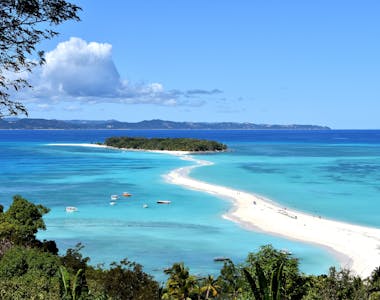

Madagascar Highlights
Book With Confidence
Monthly Payments
Spread the costs with no interest or additional fees
Best Price Guarantee
We won't be beaten on price. If you find this adventure at a lower price please get in touch!
Reserve now & pay later
Reserve your adventure today and pay later, free of charge
ATOL protected
Book with confidence
Hold your space today, for free
or book your trip with a deposit and then pay the rest in instalments.
Reserve your flights with us
Add flights to your booking and we'll take care of the rest. You'll get 24/7 support from our team & ATOL protection.
Speak to our experts
Call or email our expert team to find out more and help with ideas and planning.
